NaPoWriMo 2010
National Poetry Writing Month has begun!
National Poetry Writing Month has begun!
Orion Magazine, a twenty-eight-year-old bimonthly concerned with nature, culture, and everything in between, seeks a managing editor to join our creative, hard-working, and somewhat irreverent team in producing six print issues a year as well as a variety of digital and multimedia content. Chief among the expectations of the managing editor are the ability to acquire and edit top-notch features and to actively participate in a visionary and wide-ranging editorial conversation. The managing editor is also responsible for editing print and online departments; orchestrating the meeting and line-up process; overseeing contracts and permissions, interns and freelancers; and ensuring clear and constant communication between editorial, marketing, development, and digital media.
The person we are looking to hire is organized yet flexible, earnest, outgoing, and fun-loving, a deep thinker capable of making significant contributions to a creative conversation, with the right measure of conscience and assertiveness to keep the magazine on track. A belief in the power of writing and an understanding of environmental thinking and writing are essential, as are enthusiasm for the marriage of print and digital products and the ability to independently take projects from start to finish. The successful candidate will have at least five years’ experience as a managing or senior-level editor for a reputable general-interest or literary magazine alongside a proven track record with acquisitions.
To apply, send a résumé, cover letter, three professional references, two magazine-length editing clips (both original and final, published text), and one unedited writing sample (not to exceed 2,000 words) to:
H. Emerson Blake
Orion
187 Main Street
Great Barrington, MA 01230
Applications will be reviewed until the position is filled. No phone calls or e-mails, please. Submitted materials will not be returned without a SASE.
Applications are now being accepted for the 2010 grant cycle for the WIF Foundation Film Finishing Fund. The application period is March 23 – April 30, 2010, with winners notified August 15, 2010. The Women In Film Foundation’s Film Finishing Fund (WIFF FFF) supports films by, for or about women by providing cash grants of up to $15,000 and in-kind services.
PoetrySpeaks Reel Love Poetry Film Contest: “Submit a poetry film based on what you consider to be the greatest poem about love. Share your artistic vision and love of poetry with us and our community! Whether you are in love with love, or screaming ‘to hell with love,’ we want you to express your vision in the Reel Love Poetry Film Contest.”
Contest Judges:
PoetrySpeaks Advisory Board
Robert Pinsky, former U.S. Poet Laureate
Anne Halsey, media director of Poetry Foundation
Jim Schley, managing editor of Tupelo Press
Bruce George, poet and co-founder of Def Poetry Jam (HBO)
Emily Warn, former editor-in-chief of the Poetry Foundation
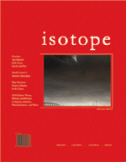 Despite a heroic battle to save the publication, Isotope (Utah State University) will cease with issue 7.2 – a special, double issue. Special thanks to Christopher Cokinos and all those who did what they could and have done all they have over the past nearly-decade of publishing Isotope.
Despite a heroic battle to save the publication, Isotope (Utah State University) will cease with issue 7.2 – a special, double issue. Special thanks to Christopher Cokinos and all those who did what they could and have done all they have over the past nearly-decade of publishing Isotope.
Edited by Francis RavinThe Short Movie Review (TSMR) online publishes reviews of movies that are available for free on the internet and that are 40 min or less in length. Now accepting submissions of reviews.

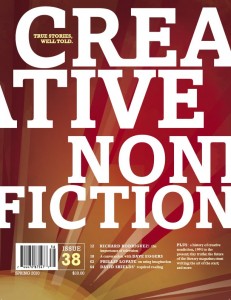 After 15 years of, Issue 38 of Creative Nonfiction is “a magazine,” taking on the larger, trade-size format on the outside, and on the inside, updated layout and design as well as expanded content: essays, columns, and more. Additionally, CNF will be adding exclusive online content for each issue. Check it all out here.
After 15 years of, Issue 38 of Creative Nonfiction is “a magazine,” taking on the larger, trade-size format on the outside, and on the inside, updated layout and design as well as expanded content: essays, columns, and more. Additionally, CNF will be adding exclusive online content for each issue. Check it all out here.
Poets Weave is five minute weekly poetry program (podcast and stream), broadcast on the NPR station WFIU, Bloomington, Indiana, featuring guest poets reading their own poems as well as poetry read by the host, Christopher Citro. Online audio archives contain 100s of shows, dating back to 2006. Recent shows include live readings by poets such as Ross Gay, Debra Kang Dean, and Alyce Miller.
If you are interested in more audio, podcasts and video, visit NewPages Guide to Multimedia.
The Alimentum Poetry Contest winning poems will be featured in the Summer 2010 issue. As selected by Contest Final Judge Dorianne Laux:
Winner “Substitutes” by Maya Stein
1st Runner-up “Before I tell him I am leaving” by Salita S. Bryant
2nd Runner-up “Water of Life” by Catherine Freeling
Our Poetry Contest Finalists:
“Rabanada” by Margaret K. Menges
“Cutlet” by Rhona McAdam
“Soup and Bread” by Mary McGinnis
“Ropa Vieja” & “Wine” by Ricardo Pau-Llosa
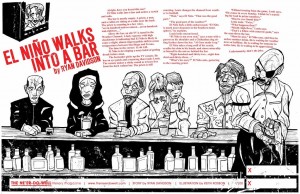 Want to know how to get a literary magazine started, here might be a good person to ask: “The Ne’er Do Well founder and editor and superwoman extraordinaire Sheila Ashdown has really outdone herself. TNDW started out as a one-woman operation and thanks to a call for volunteers has grown to a staff of a half a dozen people. Issue No. 2 features the work of Eve Rosenbaum, Lacey Jane Henson, Maggie Morgan, Kara Weiss, Stephen D. Kelly, Jane Rosenberg LaForge and yours truly, former NewPages contributor, Dan Moreau.” Also available from TNDW is this funky-cool two-color, limited-edition 11×17 poster featuring the full text of Ryan Davidson’s “El Niño Walks Into a Bar” and a custom illustration by artist Keith Rosson. Signed, numbered, and “perfect for covering up a medium-sized hole in any wall in your home or business.” A simple seven bucks, shipping included. I ordered mine.
Want to know how to get a literary magazine started, here might be a good person to ask: “The Ne’er Do Well founder and editor and superwoman extraordinaire Sheila Ashdown has really outdone herself. TNDW started out as a one-woman operation and thanks to a call for volunteers has grown to a staff of a half a dozen people. Issue No. 2 features the work of Eve Rosenbaum, Lacey Jane Henson, Maggie Morgan, Kara Weiss, Stephen D. Kelly, Jane Rosenberg LaForge and yours truly, former NewPages contributor, Dan Moreau.” Also available from TNDW is this funky-cool two-color, limited-edition 11×17 poster featuring the full text of Ryan Davidson’s “El Niño Walks Into a Bar” and a custom illustration by artist Keith Rosson. Signed, numbered, and “perfect for covering up a medium-sized hole in any wall in your home or business.” A simple seven bucks, shipping included. I ordered mine.
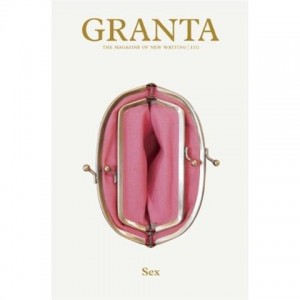
 Do you think the bookstores will cover up this cover of Granta when it hits the shelves? Will Granta have to wrap it in brown paper to send it in the mail? It reminds me of the ‘soft-core porn’ cover on Fence a few years back that garnered so much discussion about using sex to sell lit (or was it selling lit as sex?). Wheres Granta‘s issue is themed “Sex,” I don’t recall the content of Fence having a direct connection with the cover. It was simply used to help “sell” the mag. Did it work? I don’t know, but I figured there were going to be some pretty disappointed young boys who most likely would have stolen the magazine out of the bookstore only to find it filled with – poetry?! Or, who knows, maybe it’s covers like these that will someday be credited for having, well, turned some young readers on to literature.
Do you think the bookstores will cover up this cover of Granta when it hits the shelves? Will Granta have to wrap it in brown paper to send it in the mail? It reminds me of the ‘soft-core porn’ cover on Fence a few years back that garnered so much discussion about using sex to sell lit (or was it selling lit as sex?). Wheres Granta‘s issue is themed “Sex,” I don’t recall the content of Fence having a direct connection with the cover. It was simply used to help “sell” the mag. Did it work? I don’t know, but I figured there were going to be some pretty disappointed young boys who most likely would have stolen the magazine out of the bookstore only to find it filled with – poetry?! Or, who knows, maybe it’s covers like these that will someday be credited for having, well, turned some young readers on to literature.
Each Monday beginning today, Storychord.com features one story, one image, and one song – each by a different underexposed, talented up-and-comer. Editor Sarah Lynn Knowles “curates” each issue. The premier features short fiction by Tao Lin, photography by Helena Kvarnstr
James Tadd Adcox, Editor-in-Chief, Rebekah Silverman, Managing Editor, Paul Albano, Web Editor, are the working force behind Artifice Magazine, a nonprofit fiction and poetry biannual (February & September).
The first issue features works by Carol Berg, Jessica Bozek, Blake Butler, Neil de la Flor, Andrew Farkas, Ori Fienberg, Elisa Gabbert, Kelly Haramis, Roxane Gay, Kyle Hemmings, Tim Jones-Yelvington, Gregory Lawless, Jefferson Navicky, Lance Olsen, Joel Patton, Christopher Phelps, Derek Philips, Cynthia Reeser, Kathleen Rooney, Davis Schneiderman, Maureen Seaton, David Silverstein, Susan Slaverio, Kristine Snodgrass, and William Walsh.
“Artifice is looking for previously-unpublished stories, prose works, and poems, pieces that are (as the name implies) aware of their own artifice.” In addition, Artifice has pretty lengthy and entertaining Wishlist of “things that we’d be pretty excited to see in our submissions.” I can’t even begin to tell you what these are (you won’t believe me) – check it out for yourself.
Try this on for size. Take these six words – Anteros, crippled, spindles, stairwell, threshold, and whirligig – and incorporate them into a poem for possible inclusion in an exciting and daring anthology.
There are no minimum or maximum length requirements for individual poems. We, however, have a three-poem limit for submissions. The only requirement is that you incorporate all six words into one poem. We are most interested in fresh and surprising poems that seamlessly integrate the list words.
Submissions will only be accepted via e-mail. Please e-mail submissions to:
thelistanthology-at-gmail-dot-com
by May 15, 2010.
Please visit www.kennesaw.edu/thelistanthology for more information.
Newly added to NewPages Guide to Multimedia: Podcasts, Audio, Video: “Author Carole Giangrande hosts Words to Go, a showcase for up-and-coming writers, great reads and the spoken word…Carole would like to read your published stories, novel excerpts, or memoirs to her listeners. All forms of storytelling are welcome.” Giandrande also includes commentary on issues of interest to readers and writers, such as a recent post that “blasts away at literary shoplifters, memoir fakes and artsy excuses for stealing work” – the “Bernie Madoffs of the writing world” as she calls them.
Pongo Teen Writing Project blog is actively adding posts of interest to those working with young writers, especially in similar populations as Pongo’s focus – teens who are in jail, on the streets, or in other ways leading difficult lives. Here are some of the most recent posts:
Poetry, Demons, and Dragons (about a boy who created a poetic dragon to battle an inner demon)
Mike (about Seattle’s Poet Populist – and Pongo volunteer – who brings the tempests of his own life into the public discussion of poetry)
Hearts Out Loud (about kids who wrote on murder and loss, and now write with purpose and gratitude)
Shannon (about an ex-offender who volunteers in the prison where she was once incarcerated)
I Feel Like Weights Have Been Lifted (about how much the Pongo teens love writing and use it to relieve distress)
Mission Creek (about my current workshop with incarcerated women)
In response to a call for reviewers, I heard from two university professors who offered to have their students write literary magazine reviews for NewPages. The first group of reviews came from Kathlene Postma at Pacific University in Oregon, and the second, posted in March and forthcoming in April, are from Professor Jennifer Sinor at Utah State University. Sinor provided the following statement on her students:
“The journal reviewers from Utah State University are all graduate students, many of whom also teach introductory level writing courses to first and second year students. Several have interned with Isotope: A Literary Journal of Nature and Science Writing and with Western American Literature. As part of their creative nonfiction workshop, students had the opportunity to read some of the best writing being published by small and literary presses. They were impressed by the quality and diversity found in the journals, as well as by the exciting use of image. The Utah State University reviewers can be reached by contacting their instructor, Jennifer Sinor: jennifer.sinor-at-usu-dot-edu”
The student reviews are noted by the addition of “Utah State Univeristy” or “Pacific State University” after the reviewer’s name. Check out what these avid readers, current editors, and up-and-coming writers have to say about the publications.
Editor Matthew Williams has announced the first issue of the biannual Two-Bit Magazine, for which he has single-handedly edited and created the (stellar) layout and design. The issue features the works of Andrew Coburn, Alan Elyshevtiz, Barbara Donnelly Lane, Tisha Nemeth-Loomis, Wesley Moerbe, M. V. Montgomery, E. K. Mortenson, Lora Rivera, anna Saini, and Rebecca Straznickas.
The publication is online and can be downloaded as a PDF, which features bookmarks linking to each of the works. There is also an embedded version available at Scribd.com. Starting with Issue 2, Two-Bit Magazine will also be available print-on-demand through MagCloud.
For submissions, Williams says, “Two-Bit Magazine is a publication dedicated to exposing emerging, talented writers and artists, as well as new work from veterans. We are looking to build an eclectic body of work: short fiction, creative nonfiction, poetry of any genre or form, serialized novels and novellas, and graphic novels and comics. We will also accept academic work, reviews, essays.”
The 2010 Antioch Writers’ Workshop (Ohio) will award three scholarships – with both a first and second placement for each – Second place awards are NEW for the 2010 AWW.
Betty Crumrine Scholarship to a single parent who is committed to writing and who could not otherwise attend the workshop.
Judson Jerome Poetry Scholarship for a week-long conference of intensive study in poetry and an honorary seat at the banquet opening night.
Bill Baker Scholarship for a writer who is nominated by someone who can testify to his or her qualifications both as writer and community member.
Deadline: May 1, 2010
Bloodroot Literary Magazine Volume 3 (2010) features works by the winners and honorable mentions of their 2010 contest:
First Prize: David Sullivan – “Angel Jibril, the Messenger”
Second Prize: Danny Dover – “Yukon Territory”
Third Prize: Regina Murray Brault – “Genealogy”
Honorable Mentions (in alphabetical order)
Scott Atkins – “Arrival”
Eileen Malone – “What’s All This Crap About Closure?”
Ivy Schweitzer – “Elegy for a Miniskirt (Fawn, Suede)”
Ralph Lazar & Lisa Swerling are the creators of Smories, a free website for kids to watch little films of new stories being read by other kids. Inspired by their daughter, Smories “is a place for unpublished children’s story writers worldwide to get their work published free online, whilst retaining all rights. The stories will be text only (not illustrated), which will remove a common obstacle to publication for many aspiring writers.” The FAQs on the site provide complete information about rights, content, and submissions.
In order to attract great stories, Lazar and Swerling have created a US$1,500 (
Glimmer Train has just chosen the winning stories for their January Very Short Fiction competition. This competition is held twice a year and is open to all writers for stories with a word count not exceeding 3000. No theme restrictions. The next Very Short Fiction competition will take place in July. Glimmer Train’s monthly submission calendar may be viewed here.
First place: Mike Schiavone, of Gloucester, MA, wins $1200 for “Wackers.” His story will be published in the Summer 2011 issue of Glimmer Train Stories. [Photo attached. Photo credit: Sarah Tew Photography.
Second place: Jake Wrenn, of Downers Grove, IL, wins $500 for “The Accidental Marathon.”
Third place: David Abady, of Brooklyn, NY, wins $300 for “Big Girl.”
A PDF of the Top 25 winners can be found here.
Deadline soon approaching!
March Fiction Open: March 31
This competition is held quarterly and is open to all writers. Word count range: 2000-20,000. No theme restrictions. Click here for complete guidelines.
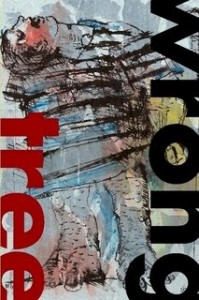 Wrong Tree Review has hit print, thanks to Founding Editors Jarrid Deaton and Sheldon Lee Compton. The first issue of this independent literary magazine features an interview with Joey Goebel, author of Commonwealth and Torture the Artist, as well as fiction from Rusty Barnes, Matt Bell, Mel Bosworth, K.L. Cook, David Erlewine, Foust, Roxane Gay, John Oliver Hodges, Stephen Graham Jones, Kilean Kennedy, Sean Lovelace, Cami Park, Ethel Rohan, J.A. Tyler, Charles Dodd White and xTx, with cover art by Dalibor Pehar.
Wrong Tree Review has hit print, thanks to Founding Editors Jarrid Deaton and Sheldon Lee Compton. The first issue of this independent literary magazine features an interview with Joey Goebel, author of Commonwealth and Torture the Artist, as well as fiction from Rusty Barnes, Matt Bell, Mel Bosworth, K.L. Cook, David Erlewine, Foust, Roxane Gay, John Oliver Hodges, Stephen Graham Jones, Kilean Kennedy, Sean Lovelace, Cami Park, Ethel Rohan, J.A. Tyler, Charles Dodd White and xTx, with cover art by Dalibor Pehar.
Unfortunately, WTR suffered a major web-tastrophy, and are in the process of rebuilding their site. The main page is up, as well as the purchase page, but others, such as the submissions page, will be forthcoming.
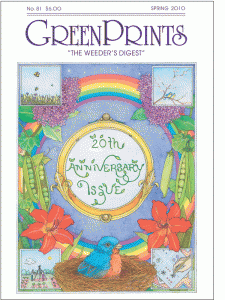 Green Prints “The Weeder’s Digest” celebrates 20 years of publishing with their Spring 2010 issue. With no greater fanfare than the cover, the contents are the same carefully selected and earnestly illustrated gardening “sharing” stories as always. Editor Pat Stone says he did add two different features to this issue: 1) he briefly introduces each piece to explain why it was selected – some great editorial insight, and 2) he adds his own writing to this issue by way of a 20-year retrospective – again, brief. Congrats Green Prints, may you keep on digging for another 20, at least!
Green Prints “The Weeder’s Digest” celebrates 20 years of publishing with their Spring 2010 issue. With no greater fanfare than the cover, the contents are the same carefully selected and earnestly illustrated gardening “sharing” stories as always. Editor Pat Stone says he did add two different features to this issue: 1) he briefly introduces each piece to explain why it was selected – some great editorial insight, and 2) he adds his own writing to this issue by way of a 20-year retrospective – again, brief. Congrats Green Prints, may you keep on digging for another 20, at least!
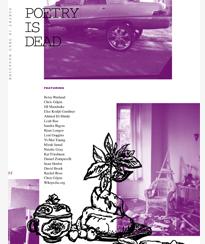 Hailing from Canada, the masthead for the biannual Poetry Is Dead starts with Editor Daniel Zomparelli, Art Director & Designer Easton West, Assistant Editor Leah Rea, and goes on to include a long list of hearts and souls supporting the work of this newly established non-profit (Poetry Is Dead Magazine Society).
Hailing from Canada, the masthead for the biannual Poetry Is Dead starts with Editor Daniel Zomparelli, Art Director & Designer Easton West, Assistant Editor Leah Rea, and goes on to include a long list of hearts and souls supporting the work of this newly established non-profit (Poetry Is Dead Magazine Society).
This first issue includes:
Essays “Poetry Is Dead: The Autopsy: What does this mean for Canadian poetry?” by Editor; “The Shrinking Space of Poetry” by Betsy Warland; “The Living Language of Spoken Word” by Chris Gilpin.
Poems by Chris Gilpin, Sean Horlor, David Brock, Rachel Rose, Jill Mandrake, Elee Kraljii Gardiner, Ahmed El-Hindy, Leah Rae, Sandra Bigras, Ryan Longoz, Leni Goggins, Yi-Mei Tsiang, Mirak Jamal, Natalie Gray, and Kat Friedman.
Interview with James Deahl.
Issues are currently themed, and submissions are being accepted for the next issue: TV, Beer and Video Games. Deadline May 31.
From War, Literature & the Arts Journal Fiction Editor Jesse Goolsby:
“The 2010 War, Literature & the Arts Conference (Sept 16-18, Colorado Springs, CO) seeks authors and poets to read their work (fiction, non-fiction, poetry) at this distinguished, international conference. The theme of the conference is the “Representation and Reporting of America’s Wars: 1990-Present”. Mark Boal, screenwriter and producer of The Hurt Locker, heads our keynote speakers.” Deadline May 1, 2010.
The conference is also open for submissions for conference sessions until May 1, 2010.
Vermont College of Fine Arts’ Hunger Mountain (n14, 2009) features a section on Young Adult and Children’s Literature that includes Katherine Paterson’s keynote speech at VCFA, October 2008 (“Fellow Travelers”), Liz Cook’s winning entry for the 2009 Katherine Paterson Prize for Young Adult and Children’s Writing (Crazy Cat), and Janet S. Wong’s discussion with examples of the Poet’s Process.
The Hunger Mountain web site includes a full-content section on Young Adult and Chilren’s Literature, including a tribute to Norma Fox Mazer, essays on controversial issues (writing about sex and whether or not children’s poetry “matters”), discussions of female fairy tale characters, a tool box, fiction, poetry, and more.
 Ai (American poet born Florence Anthony, October 21, 1947) passed away March 20. You can read her obituary via the Oklahoma State University website, as well as some kind words of remembrance on Oliver de la Paz’s blog.
Ai (American poet born Florence Anthony, October 21, 1947) passed away March 20. You can read her obituary via the Oklahoma State University website, as well as some kind words of remembrance on Oliver de la Paz’s blog.
Delta College, Michigan – Vice President of Instruction and Learning Services. Open until filled, but was posted today (March 22).
Copy Editor for Coastal Living Magazine, Birmingham, Alabama.
Distinguished Visiting Writer at Bowling Green State University for 2011. Begin review June 14.
BECA: Bridge for Emerging Contemporary Art is seeking a Development Director.
A note from Yelizaveta P. Renfro: “Thank you for your recent post on ‘Bruce Guernsey and Multiple Submissions.’ I am wondering, however, about the term ‘multiple submissions.’ In my understanding, the term ‘simultaneous submission’ means that a piece has been submitted to more than one magazine or journal at the same time — which is what is being described in the post. The term ‘multiple submission,’ I believe, means submitting more than one work to the same magazine or journal at the same time, though it seems to me that this term is often misused. There are a number of markets that do make a distinction between the two, including Third Coast and Rattle. Other journals, however, seem to confuse the terms or use them interchangeably.”
Thanks for your question/comment Yelizaveta. I’ll open this one up for comments/conversation.
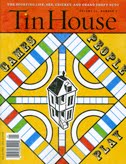 Issue 43 of Tin House, themed “Play,” includes a poetry section titled, “Exquisite Corpse: Sure it’s a little game. You, me, our minds.” The game, as is explained, has its beginnings in 1925 at 54 rue du Chateau in Paris with Andre Breton and his friends: “one player writes down a phrase and passes it to another player, who writes her own phrase below the first, then folds the paper to hide the first phrase from the next person, who herself then writes, folds and passes, only the previous addition visible to the next person in line. The result is an accordioned piece of paper printed with a bewildering narrative that often has its own strange sense.” Others have emulated and adapted this game, and Tin House now throws in their own version with players Mary Jo Bang, Nick Flynn, Alex Lemon, Matthea Harvey, Eileen Myles, and D.A. Powell each writing their own section and the next player picking up the last line as their first.
Issue 43 of Tin House, themed “Play,” includes a poetry section titled, “Exquisite Corpse: Sure it’s a little game. You, me, our minds.” The game, as is explained, has its beginnings in 1925 at 54 rue du Chateau in Paris with Andre Breton and his friends: “one player writes down a phrase and passes it to another player, who writes her own phrase below the first, then folds the paper to hide the first phrase from the next person, who herself then writes, folds and passes, only the previous addition visible to the next person in line. The result is an accordioned piece of paper printed with a bewildering narrative that often has its own strange sense.” Others have emulated and adapted this game, and Tin House now throws in their own version with players Mary Jo Bang, Nick Flynn, Alex Lemon, Matthea Harvey, Eileen Myles, and D.A. Powell each writing their own section and the next player picking up the last line as their first.
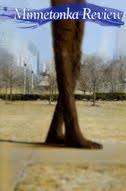 The Winter 2010 issue of Minnetonka Review features the works of Editor’s Prize Awards winners for poetry, Brandon Krieg, and for prose, Stephen Graf. The Editor’s Prize generally recognizes writers who’ve not published a major book by awarding $150 to one prose and one poetry author from each issue.
The Winter 2010 issue of Minnetonka Review features the works of Editor’s Prize Awards winners for poetry, Brandon Krieg, and for prose, Stephen Graf. The Editor’s Prize generally recognizes writers who’ve not published a major book by awarding $150 to one prose and one poetry author from each issue.
Here’s something to do on a rainy day: Young Me / Me Now.
The Allegheny Review, publishing undergraduate poetry, artwork and prose since 1983, established the Allegheny Review awards in poetry and prose eight years ago. Mark Doty selected Jacques Rancourt (University of Maine) to receive this year’s poetry award, and Paul Lisicky selected prose winner Marilyn Miller (University of Pittsburgh at Johnstown). Both winning authors’ works can be found in the newest edition of The Allegheny Review (v27) along with honorable mention poet Jes Gearing (Emory University).
AlphaAlpha, an animated netbook of letters: “The concept of this netbook is the proper “history of writing, which is, in a way, the history of the human race, since in it are bound up, severally and together, the development of thought, of expression, of art, of intercommunication, and of mechanical invention.”
AlphaAlpha is composed of 365 instances of the letter “A” plus one more for the leap year. The letters are collected in groups of about ten. “AlphaAlpha” is a collaborative work and includes participants artists & poets from several places around the world. AlphaAlpha is a good example of the possibilities of net art.
It is better visualized with Firefox and 1200 X 800 screen resolution.
[via Regina Pinto]
From the Morning Sentinel: Book clubs for health professionals and humanities requirements in med school as a way to help those in the medical profession “connect” with the whole human: “If you want to understand what someone who is dying is going through, the highs and lows, the emotions, read Tolstoy’s `The Death of Ivan Ilych,'” said Dr. Robin Blake. “One hundred years before Kubler-Ross identified the stages of dying, Tolstoy had it.”
With its fourth issue, J Journal, published by the John Jay College of Criminal Justice at The City University of New York, introduces photography as a regular feature. Though, they are hoping to “stay away from shots of generic justice – police, inmates, judges, balancing scales,” and instead hope that the images, like the poetry and prose included, “speak to the justice issue from unusual, subtle, evocative angles.” Readers, you’ll be the judge of that.
Not your standard fare in travel writing, Nowhere is travel writing about “a place between places, an imagined depot for stories from the road. We collect found experiences through writing, art, video and sound then illustrate them with objects brought back from the field.” It is not travel that has been “confused with tourism” nor lists of “ten awesome things to do,” but that remainder of honest field writing that once used to so fascinate us before we thought we had discovered the whole planet. We haven’t, and Nowhere proves that the written word still has a great deal left to explore.
Editor: Porter Fox
Designer: Manda Yakiwchuck
Interactive Producer: A’yen Tran
Liberal Copy Editor: Kim Stravers
Contributing Artists: Kara Blossom, Tony Bones, Antonin Kratochvil, Orien McNeil, Swoon
Contributing Writers: Bill Berkson, Alan Bernheimer, Arthur Bradford, Larry Fagin, Heidi Julavits, Josip Novakovich, David Quammen
Nowhere does not accept unsolicited writing, but welcomes letters to their online forum.
“Despite the beauty of the five naked women, the titillation part of the evening ended fairly quickly. There was no dancing, twirling, or bending over backward; legs remained primly crossed or tucked together. Unless you’re a 13-year-old boy (with remarkable facial hair and a really good fake ID), you’re not going to be aroused by the mere proximity of naked women sitting in front of a coffee table covered with Star Wars paraphernalia. Which means that the reading itself has to be good, or else you’re going to get pretty fucking bored pretty fucking quickly. Luckily, the reading was very good.” Read more on Fleshing Out the Narrative by Paul Constant for The Stranger.
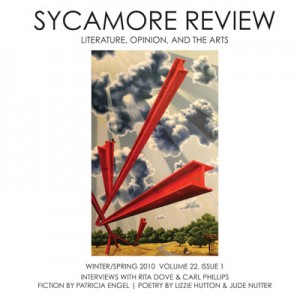 Anthony Cook has taken over as Editor-in-Chief of the Sycamore Review, trying, as he says, to “build on the legacy” of Mehdi Okasi. “Not easy,” he comments, “at a journal where, by design, editorships roll over every year or two. I sometimes envy journals that are able to develop a focused and consistent aesthetic. Such focus makes a journal easier to market; you can find your readership and generate a following.” But, after six months at the helm preparing this newest issue, he’s convinced that “while such a set-up might seem ideal, it would greatly diminish the value of what, I believe, our journal can offer…In short, dissonance and diversity are our strengths, and they make for the kind of stimulating reading experience for which I long.” And for which Sycamore Review is known to deliver!
Anthony Cook has taken over as Editor-in-Chief of the Sycamore Review, trying, as he says, to “build on the legacy” of Mehdi Okasi. “Not easy,” he comments, “at a journal where, by design, editorships roll over every year or two. I sometimes envy journals that are able to develop a focused and consistent aesthetic. Such focus makes a journal easier to market; you can find your readership and generate a following.” But, after six months at the helm preparing this newest issue, he’s convinced that “while such a set-up might seem ideal, it would greatly diminish the value of what, I believe, our journal can offer…In short, dissonance and diversity are our strengths, and they make for the kind of stimulating reading experience for which I long.” And for which Sycamore Review is known to deliver!
The newest issues of Limestone, from the Department of English at the University of Kentucky features fiction by Jason Grant, winner of the Dantzler Award for Fiction, and Bianca Bargo, winner of the Farquhar Award for Poetry.
Poetry Noir, sponsored by the Montgomery County Poet Laureate Program, invites you to view a black and white film available on their site and “use the feelings, memories, reflections, landscapes, characters or behaviors of the film imagery and sounds (selected by PoetryNoir) as a source of inspiration for poetry writing.” Currently on tap: Buster Keaton’s 1928 film The Cameraman.
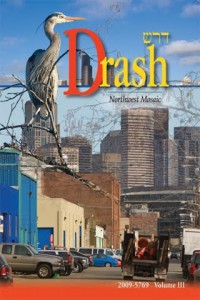 In the latest issue of Drash, Pam Grossman’s poem “Kaddish” – a Hebrew prayer for the dead – is offered to a tree. It begins: “Our tree is dying / hunks of splintered bark peel away / branches creak ominously / then litter the yard with brittle bones // The tree surgeon arrives, surveys the damage / proffers a prognosis / two years at most.”
In the latest issue of Drash, Pam Grossman’s poem “Kaddish” – a Hebrew prayer for the dead – is offered to a tree. It begins: “Our tree is dying / hunks of splintered bark peel away / branches creak ominously / then litter the yard with brittle bones // The tree surgeon arrives, surveys the damage / proffers a prognosis / two years at most.”
It reminded me of trees I have known, and the willingness of some people to care for them rather than just tear them down when they are ill or diseased. It also brought to mind the chestnut tree at the Anne Frank house in Amsterdam, that years ago was very ill and many feared would need to be removed. The tree had been mentioned numerous times in Anne’s diary – being one of the few images of nature she could see during the day through the uncovered attic window. The tree was not only saved and remains under care, but seedlings from its chestnuts were sprouted and shared. You can read more about it on the Anne Frank Museum Amsterdam website, including an interactive monument to the Anne Frank Tree where you can “Leave a Leaf.”
The Spoon River Poetry Review Editor Bruce Guernsey adds his two cents in the Summer/Fall 2009 issue on the misuse of multiple submissions. Though he completely understands their use given the “exasperating expectation of waiting,” only to receive a rejection letter, he recounts his having read several cover letters for contest poems also submitted to other contests, with checks written out to those other contests – and others not signed or bounced – and of going through the time-consuming process on his end, only to have the poems rescinded because they were accepted elsewhere. It’s also general submissions as well that he is more often receiving at SRPR, but with another publication’s name on the letter.
Guernsey recalls Donald Hall’s labeling of this multiple submissions batching as “McPoem” and the movement of “poe-biz.” Guernsey writes: “In addition, the letters themselves have taken on a generic sameness: an opening paragraph asking that the poems be considered…then an indented section in bold face listing the poems, and last by a longer paragraph listing the poet’s publications and mandatory M.F.A. I have also heard (with horror) that there are actual services out there that will handle all of one’s submissions and rejections, getting poems constantly in the mail and frantically keeping them there.
“‘Multiple submissions’ is conducive to mass production, and acquiring a long list of publishing credits has become, for some, their goal. But poetry is not some kind of commodity like pork bellies. We should care where our poems go and who reads them. Anne Bradstreet even thought of her poems as her children – a sentimental notions perhaps, but one that kept her from sending them carelessly into the street.”
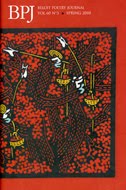 In addition to the beautiful cover (Ding Jitang “Picking Persimmons,” Xi’an, China, 2000) and the carefully selected poetry to fill its pages, this issue (v60 n3) of Beliot Poetry Journal includes a conversation with Coleman Barks by John Rosenwald and Ann Arbor. In it, they talk about “the relationship between music and poetry, isolation and community, judgment and acceptance.”
In addition to the beautiful cover (Ding Jitang “Picking Persimmons,” Xi’an, China, 2000) and the carefully selected poetry to fill its pages, this issue (v60 n3) of Beliot Poetry Journal includes a conversation with Coleman Barks by John Rosenwald and Ann Arbor. In it, they talk about “the relationship between music and poetry, isolation and community, judgment and acceptance.”
For anyone who has seen Barks read along with musicians (visit YouTube if you have not), this interview adds another layer of depth to the idea of poetry and music combined, as well as to the complexity of Barks. As Barks says of joining his reading with musicians, “I work regularly with cello; I mean any instrument. The poem feels just so bare or something; I think the music puts it out of the mind, puts it in that layer below, back down in the water table. Somewhere the music lets the personality maybe dissolve a little more, or the ego. A lot of people think that the poem should stand on its own, but it feels good; it feels like I’m giving up some of my proudness, pride in the language of selection, when I let the music carry it along.”
NewPages Literary Magazine Reviews
The Antigonish Review
The Barcelona Review
Black Warrior Review
Cadences
Carpe Articulum
The Gettysburg Review
Iron Horse Literary Review
The Kenyon Review
The Laurel Review
The Literary Review
The Massachusetts Review
New Letters
Ninth Letter
North Dakota Quarterly
Poetry
Southern Humanities Review
THEMA
The Threepenny Review
West Branch
World Literature Today